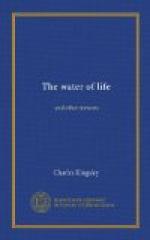‘If a man keep my saying, he shall never see death.’
And again, ’He that believeth in Me, though he were dead, yet shall he live; and he that liveth and believeth in Me shall never die.’
Do such words as these mean only that we shall rise again in the resurrection at the last day? Surely not. Our Lord spoke them in answer to that very notion.
’Martha said to Him, I know that my brother shall rise again, in the resurrection at the last day. Jesus said unto her, I am the resurrection and the life;’ and then showed what He meant by bringing back Lazarus to life, unchanged, and as he had been before he died.
Surely, if that miracle meant anything, if these words meant anything, it meant this: that those who die in the fear of God, and in the faith of Christ, do not really taste death; that to them there is no death, but only a change of place, a change of state; that they pass at once, and instantly, into some new life, with all their powers, all their feelings, unchanged,—purified doubtless from earthly stains, but still the same living, thinking, active beings which they were here on earth. I say, active. The Bible says nothing about their sleeping till the Day of Judgment, as some have fancied. Rest they may; rest they will, if they need rest. But what is the true rest? Not idleness, but peace of mind. To rest from sin, from sorrow, from fear, from doubt, from care,—this is the true rest. Above all, to rest from the worst weariness of all—knowing one’s duty, and yet not being able to do it. That is true rest; the rest of God, who works for ever, and yet is at rest for ever; as the stars over our heads move for ever, thousands of miles each day, and yet are at perfect rest, because they move orderly, harmoniously, fulfilling the law which God has given them. Perfect rest, in perfect work; that surely is the rest of blessed spirits, till the final consummation of all things, when Christ shall have made up the number of His elect.
I hope that this is so. I trust that this is so. I think our Lord’s great words can mean nothing less than this. And if it be so, what comfort for us who must die? What comfort for us who have seen others die, if death be but a new birth into some higher life; if all that it changes in us is our body—the mere shell and husk of us— such a change as comes over the snake, when he casts his old skin, and comes out fresh and gay, or even the crawling caterpillar, which breaks its prison, and spreads its wings to the sun as a fair butterfly. Where is the sting of death, then, if death can sting, and poison, and corrupt nothing of us for which our friends have loved us; nothing of us with which we could do service to men or God? Where is the victory of the grave, if, so far from the grave holding us down, it frees us from the very thing which holds us down,—the mortal body?




